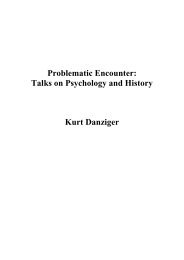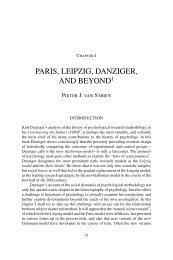The positivist repudiation of Wundt - Kurt Danziger
The positivist repudiation of Wundt - Kurt Danziger
The positivist repudiation of Wundt - Kurt Danziger
Create successful ePaper yourself
Turn your PDF publications into a flip-book with our unique Google optimized e-Paper software.
THE POSITIVIST REPUDIATION OF WUNDT 215<br />
individual” Ebbinghaus substituted the more elegant term “organism,” a variant that<br />
would quickly come into general use: “[Psychology] treats <strong>of</strong> those structures, processes,<br />
relations <strong>of</strong> the world whose peculiarity is essentially conditioned by the constitution and<br />
functions <strong>of</strong> an organism, an organized individual.” 39 What is important here, and what<br />
was <strong>of</strong> course unacceptable to <strong>Wundt</strong>, is that the “organized individual” is conceived ex-<br />
clusively as a biological organism and not as an agent producing cultural values. Eb-<br />
binghaus rather lamely defended Kiilpe against <strong>Wundt</strong> by saying that the study <strong>of</strong> ex-<br />
periences which share the quality <strong>of</strong> dependence on the individual is not equivalent to the<br />
study <strong>of</strong> experiences in their dependence on the individual. <strong>Wundt</strong> mistakenly attacked<br />
the latter variant while Kiilpe only meant to maintain the former position. This, <strong>of</strong><br />
course, does not speak to the major issue at stake, whether psychological theory is to<br />
recognize psychological causes in its attempts at explanation, or whether it is to restrict<br />
itself to physical causes or the mere recording <strong>of</strong> functional relationships,<br />
Ebbinghaus was not the only one <strong>of</strong> the historically important group <strong>of</strong> younger psy-<br />
chologists who sympathized with Kulpe’s Machian and anti-<strong>Wundt</strong>ian position.<br />
Titchener, perhaps directly through his close association with Kiil~e,~O adopted the<br />
<strong>positivist</strong> philosophy <strong>of</strong> science and its definition <strong>of</strong> the place, methods, and aims <strong>of</strong> psychology.<br />
Although Titchener exhibited a certain diffidence about expressing himself explicitly<br />
on these fundamental issues, Boring, who was certainly in a position to know,<br />
tells us, “<strong>The</strong> teaching <strong>of</strong> Mach and Avenarius seems to have been ingrained even into<br />
Titchener’s everyday thinking.” 41 While it is certainly not difficult to discern the implicit<br />
Machian philosophy that underlies Titchener’s discussions <strong>of</strong> theoretical issues in psychology,<br />
he reserved his elaborated statement <strong>of</strong> that position for his magnum opus, the<br />
Systematic Psychology which was never completed. <strong>The</strong> only parts which he did in fact<br />
write were those dealing with the nature <strong>of</strong> science and the definition <strong>of</strong> psychology,<br />
topics on which his mind had been made up long before. But because these chapters were<br />
supposed to introduce the more concrete sections that were never written, they rested<br />
among his papers until they were finally published posthum~usly.~~<br />
For Titchener, the aim <strong>of</strong> science, and therefore <strong>of</strong> psychology, was description. He<br />
based himself on Mach’s characteristic statements that “the grand universal laws <strong>of</strong><br />
physics, such as apply indiscriminately to material, electrical, magnetic and other<br />
systems, are not essentially different from description.” 43 Explanatory concepts, ins<strong>of</strong>ar<br />
as they have any value, are simply economical descriptions; there is no psychic causality,<br />
any more than there are real physical forces, and science cannot go beyond the observation<br />
and description <strong>of</strong> the elements <strong>of</strong> experience and their connection. <strong>Wundt</strong>’s view <strong>of</strong><br />
science as essentially a conceptual, constructual activity is emphatically rejected. As a<br />
consequence, Titchener had no use for <strong>Wundt</strong>’s definition <strong>of</strong> the relationship <strong>of</strong> psychology<br />
and natural science and, like Kiilpe, turned to Avenarius for his own definition.<br />
Psychology studies experience as dependent on “the biological individual.” Titchener understood<br />
very well that when Avenarius and Mach speak <strong>of</strong> the individual in this context<br />
they cannot and do not mean the individual as a knowing subject, because the latter is<br />
merely a convenient fiction that refers to certain combinations <strong>of</strong> sensations (see Mach<br />
on the ego). <strong>The</strong> individual <strong>of</strong> <strong>positivist</strong> psychology has to be the biological organism.<br />
<strong>The</strong>refore, Titchener always rejected the notion that psychology dealt with “private” experience<br />
any more than any other branch <strong>of</strong> science. Psychology could only live up to its<br />
claim to the status <strong>of</strong> a science if it rejected any attempt to study experience in relation to<br />
a knowing subject or agent. As long as the only subject it recognized was the biological<br />
organism, the limitations on the universal validity <strong>of</strong> its observations were simply a func-





